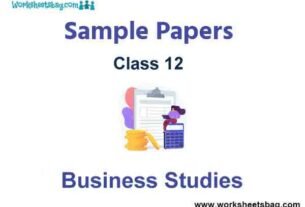Please refer to Class 12 Business Studies Sample Paper Term 2 Set B with solutions below. The following CBSE Sample Paper for Class 12 Business Studies has been prepared as per the latest pattern and examination guidelines issued by CBSE. By practicing the Business Studies Sample Paper for Class 12 students will be able to improve their understanding of the subject and get more marks.
CBSE Class 12 Business Studies Sample Paper for Term 2
1. Distinguish between monetary and non-monetary incentives.
Ans. Monetary incentives involve payment of money in cash or kind e.g. bonus. On the other hand, no money payment is involved in case of non-monetary incentives. Challenging job, recognition, participation in decision-making, friendly supervision are some examples of non-monetary incentives.
2. Stock exchanges in India have adopted online screen-based electronic trading system. Therefore, shares and debentures held by investors have to be converted into electronic form for trading. The new trading system is more convenient, open, fast and safe. It has, therefore, created an equity cult among investors.
(a) Name the process of converted securities from physical form to electronic form.
(b) What an investor must do for the process named in (a).
Ans. (a) Dematerialisation
(b) An investor must open a ‘Demat Account’ with a Depository Participant (DP) for converting physical securities into electronic form.
3. Recruitment is one of the specialised activities performed by human resource management. Mention any two specialised activities of human resource management.
Ans. (i) Analysing jobs and collection of information to prepare job descriptions and job specifications.
(ii) Developing compensations and incentive plans.
4. Explain how controlling helps in ‘achieving better co-ordination’ and ‘better planning?
Ans. The controlling function lays down performance standards for each department and employee which are well co-ordinated with one another, thereby helping in achieving better co-ordination in the organisation. The controlling function, by revising existing plans in light of the deviations, if any, and laying the basis for the formulation of new plans, helps in better planning.
5. Explain any three points of importance of the controlling function of management.
Ans. Importance of controlling (explain any three)
(i) Accomplishing organizational goals.
(ii) Making efficient use of resources.
(iii) Ensuring order and discipline.
(iv) Improving employee motivation.
(v) Judging accuracy of standards.
(vi) Facilitating co-ordination in action.
6. Compare the internal and external sources of recruitment.
OR
Neha was a regional sales manager in ‘Good Look Garments Ltd.’ for ten years. On the retirement of the Marketing Manager, Neha applied for the same post as she was extremely ambitious and had dedicated all her energies to obtain the post of Marketing Manager. However, the top management of the company decided to fill this post by selecting a better person from outside the company. Because of this, Neha was heart-broken and her performance declined. When the new marketing manager joined, one of her major problems was how to motivate and inspire Neha to her former level of performance? Suggest any three non-financial incentives that the new marketing manager may use to motivate Neha.
Ans. Comparison between internal and external sources of recruitment:

OR
Ans. (i) Career Advancement Opportunities: Neha should be provided career promotion opportunities by developing her knowledge and skills.
(ii) Status: Neha may be given the status of Deputy Marketing Manager. This will satisfy Neha’s psychological or esteem needs.
(iii) Job Enrichment: Neha’s job may be enriched by greater variety of work, giving her more autonomy and responsibility.
7. Explain the meaning of Financial Planning. Why is it important? Give any two reasons.
Ans. Financial planning is the process of preparation of a financial blueprint of an organisation’s future operations.
Financial planning is important due to the following reasons:
(i) It helps in avoiding shortage and excess of funds.
(ii) It provides a link between investment decision and financial decision.
8. Pramod was a supervisor at a ‘Annapurna Aata’ factory. The factory was producing 200 quintals of aata every day. His job was to make sure that the work goes on smoothly and there was no interruption in production. He was a good leader who would give orders only after consulting his subordinates and work out the policies with the acceptance of the group. Identify and describe the leadership style being adopted by Pramod.
Ans. Democratic style of leadership.
(i) A democratic leader involves decision making by the group. This improves the attitude of the employees towards their jobs and the organisation thereby increasing their morale.
(ii) This style allows the subordinates to work as a team.
9. Explain the six rights of consumers as provided under the Consumer Protection Act, 2019.
OR
‘RO Youth Club’ organised a visit of its members to an old age home to inculcate the habit of social work among them. The visit revealed that the living conditions of inmates of the old age home were not hygienic. So, the RO youth club members decided to clean the premises. During this cleanliness drive, they realised that the old age home also required pest control. But some of the inmates of the old age home were reluctant for it because they believed that the pest control may create health problems for them. RO Youth Club, therefore, decided to provide ethical, safe and odourless pest control. They showed to the inmates of the old age home a pamphlet of the proposed pest control product which promised easy, inexpensive and long-lasting pest control. The inmates happily agreed and the pest control was carried out. The effect of the pest control started wearing off after a fortnight RO Youth Club contacted the pest control company which kept on postponding their visit after waiting for a month, RO Youth Club filed a case in the consumer court.
The consumer court was satisfied about the genuineness of the complaint and issued necessary directions to the pest control company.
State any six directions that might have been issued by the court.
Ans. The six rights of consumers under the Consumer Protection Act, 1986 are as follows:
(i) Right to safety: The consumer has a right to be protected against goods and services which are hazardous to life and health. For example, electrical appliances which are not ISI marked might cause serious injury.
(ii) Right to be informed: The consumer has a right to have complete information about the product including its ingredients, date of manufacture, price, quantity, directions for use, etc.
(iii) Right to be assured: The consumer has the right to be given the freedom to choose from a variety of products at competitive prices. The marketers must allow consumers to make a choice from a wide variety of products.
(iv) Right to be heard: The consumer has a right to file a complaint and to be heard in case of dissatisfaction with a product or service.
(v) Right to seek redressal: The consumer has a right to get relief in case the product or service falls short of his expectations.
(vi) Right to consumer education: The consumer has a right to acquire knowledge and to be a well informed consumer throughout life.
OR
Ans. Directions that might have been issued by the court.
(i) To remove the deficiency in service.
(ii) To refund the price paid for the service provided.
(iii) To pay punitive damages.
(iv) To pay adequate costs to RO Youth Club.
(v) To issue corrective advertisement to neutralize the effect of misleading pamphlet.
(vi) To discontinue the unfair/restrictive trade practice and not to repeat the same in future.
10. A businessman who wants to start a manufacturing concern approaches you and wants you to suggest to him whether the following manufacturing concerns require large or small working capital:
(a) bread
(b) coolers
(c) sugar
(d) furniture manufacture against specific orders
(e) motor car
Give your viewpoint with reasons in support of each of the above cases.
Ans. (a) Bread: It will require small-working capital due to quick turnover of cash.
(b) Coolers: It will require large-working capital due to seasonal nature of the product.
(c) Sugar: It will require large-working capital due to long operating cycle.
(d) Furniture: It will require small-working capital because no inventory of finished product is to be maintained.
(e) Motor Car: It will require large working capital due to long operating cycle.
11. Explain the limitations of internal sources of recruitment.
Ans. Internal sources of recruitment suffer from the following limitations:
(a) When vacancies are filled from within, there is little induction of fresh talent into the organisation. There is danger of ‘inbreeding’.
(b) The spirit of competition among the employees may be hampered.
(c) When employees are sure of time-bound promotions they may become lethargic.
(d) No organisation can fill all its vacancies from internal sources. A new enterprise cannot use internal source of requirements.
(e) Frequent transfers of employees may disrupt the operations and reduce productivity.
12. Sakshi Ltd is a company manufacturing electronic goods. It has a share capital of Rs 120 lakhs. The earning per share in the previous year was Rs 0.5. For diversification, the company requires additional capital of Rs 80 lakhs. The company raised funds by issuing 10% debentures for the same. During the current year the company earned profit of Rs 16 lakhs on capital employed. It paid tax @ 40%.
(a) State whether the shareholders gained or lost in respect of earning per share on diversification. Show your calculations clearly.
(b) Also state any three factors that favour the issue of debentures by the company as part of its capital structure.
OR
What are the methods of floating new issues in the primary market?
Ans. Calculation of earning per share after issue of debentures

Earning per share has declined from Rs 0.5 to Rs 0.4. Therefore, shareholders lost on diversification.
(b) Three factors that favour issue of debentures.
(i) Lower cost of debentures when return on investment is higher than the invest payable on debentures.
(ii) No dilution of control as debenture holders do not have voting rights.
(iii) Interest payable on debentures reduces the tax burden.
OR
Ans. The methods of floating new issues in the primary market are as follows:
(i) Offer through prospectus: This involves inviting subscription from the public by issuing a prospectus. The prospectus makes a direct appeal to investors to subscribe to the shares or debentures of the company. Advertisements are given in newspapers, magazines and TV for this purpose. This is the most popular method of floatation in the primary market.
(ii) Offer for sale: Under this method, securities are not issued directly to the public. Rather, these are offered for sale through intermediaries like issue houses and stock brokers. The company sells securities en bloc at an agreed price to intermediatries who in turn resell them to the investing public.
(iii) Private placement: It means the allotment of securities to institutional investors and some selected individuals. It helps to raise capital more quickly than a public issue. It is less costly than a public issue. Companies which cannot afford a public issue prefer to use private placement.
(iv) Rights Issue: This is a privilege given to the existing shareholders to subscribe to new issue of shares as per the terms and conditions of the company. The existing shareholders are offered the ‘right’ to buy new shares in proportion to the number of shares already held by them.
(v) e-IPOs: This is issue of securities to the public through the online system of the stock exchange. The company enters into an agreement with the stock exchange. This is known as Initial Public Offer (IPO). The issuing company appoints a registrar to the issue. The registrar must have electronic connectivity with the stock exchange. SEBI registered brokers have to be appointed for receiving applications.

